|
|
|
Sort Order |
|
|
|
Items / Page
|
|
|
|
|
|
|
| Srl | Item |
| 1 |
ID:
079901
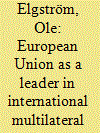

|
|
|
|
|
| Publication |
2007.
|
| Summary/Abstract |
This article analyses the leadership role of the European Union (EU) in international multilateral negotiations. The purpose is to problematize the role of the EU as a multilateral leader by contrasting its self-images as an active initiator with other negotiating actors' perceptions of the Union. This is done by comparing the role conceptions presented by EU representatives with the images presented by delegates from non-member states in three different multilateral negotiating contexts. My results present a picture of the EU as a `restricted leader'. The undisputable great power status that the EU is claimed to hold is not necessarily transformed into a leadership role. The causes vary: in two cases it is internal disunity and co-ordination problems that create obstacles to intellectual leadership; in the third case it is perceived role conflicts that make the EU less than credible in its leadership aspirations. The existing potential for structural leadership is therefore not translated into practice
|
|
|
|
|
|
|
|
|
|
|
|
|
|
|
|
| 2 |
ID:
183708
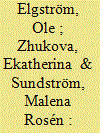

|
|
|
|
|
| Summary/Abstract |
Drawing on the IR theories of norm translation and strategic narratives, this article focuses on how states translate international norms to their own advantage by producing strategic narratives to advance their soft power ambitions abroad. Using the example of feminist foreign policy (FFP), the article compares Sweden, Canada, France, and Mexico in their attempts to translate international feminist norms into their countries’ strategic narratives. This comparison is based on three strategic narrative types (issue, national, and international system narratives) and two types of feminism (liberal, intersectional). Issue narratives reveal that Sweden and Mexico give more priority to social policies, while France and Canada emphasise the role of the market in addressing gender inequality. International system narratives demonstrate that Sweden and Mexico perceive global challenges as drivers of gender inequality, while France and Canada see gender inequality as a cause of global problems. National narratives show that Sweden and Mexico refer to other FFP countries to ‘back up’ their feminist initiatives, while France and Canada do not relate to other states. Finally, while liberal feminism dominates all four FFPs, each state either prioritises particular aspects of it (legal, market, security, rights-based) or incorporates elements from intersectional feminism.
|
|
|
|
|
|
|
|
|
|
|
|
|
|
|
|
| 3 |
ID:
170753
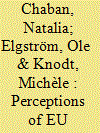

|
|
|
|
|
| Summary/Abstract |
A small but growing literature has started to analyse the European Union (EU) ‘as an effective peacemaker’. We make a contribution to this field by investigating EU mediation effectiveness in the Russia–Ukraine conflict. The focus is on perceptions of effectiveness. Based on information from semi-structured interviews, we compare EU self-images with Ukrainian evaluations of EU mediation efforts. How effective is the EU, including its Member States, deemed to be? What factors are believed to lie behind perceived (in)effectiveness? We concentrate on four such factors, derived from the mediator literature: perceived (im)partiality, coherence and credibility and, finally, evaluations of the EU’s mediation strategies. Both internal and external views singled out EU member states as the most effective actors in current mediation. The role of EU was seen in ambivalent terms by both sides. All the four determinants of mediation effectiveness are discussed in our material, but differ considerably in the degree of attention given to each of them. While (im)partiality is not a factor that is linked to effectiveness in any straightforward way, EU incoherence is associated with inconsistent and weak policies, notably in the Ukraine material.
|
|
|
|
|
|
|
|
|
|
|
|
|
|
|
|
| 4 |
ID:
159781
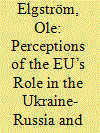

|
|
|
|
|
| Summary/Abstract |
This article focuses on how the European Union’s (EU) mediation activities during the Russia-Ukraine and Israel-Palestine conflicts are perceived by local elites. Our analysis is based on recent interviews with decision makers in Ukraine, Israel and Palestine. Consistent with this special issue, we investigate perceptions of EU roles, strategies and effectiveness. We suggest that the EU’s relation to the parties may affect their perceptions of EU conflict mediation efforts. Specifically, we expect that the EU is perceived as a biased mediator in both cases due to perceived close relations to one or more conflict parties. However, contrary to our expectations and widespread assumption in mediation theory, while such a bias exists, we found it is not perceived as a main cause of EU ineffectiveness. Other factors, including the prominence of other mediators and internal EU disunity, are perceived as more detrimental to EU efficacy.
|
|
|
|
|
|
|
|
|
|
|
|
|
|
|
|
| 5 |
ID:
088479
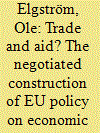

|
|
|
|
|
| Publication |
2009.
|
| Summary/Abstract |
Efforts by the European Commission and by leading member states, to normatively frame the debate about trade - and thus rhetorically entrap other actors by references to previous commitments - are ubiquitous; and member states do take account of the potential effects of their actions, in terms of potential praise or shaming, and adapt their behaviour to the institutional setting. However, this holds true only up to a certain limit. If sensitivity to domestic constituencies is high enough and the issue gets politicized, then member states may break ranks regardless of institutionalized normative constraints, especially if the issue-area is linked to proclaimed key self-images of the government. External pressure can also play its part. Indeed, the Commission's reluctant decision to include development sections in the final offer was arguably not only the result of internal member state activity, but also of pressure from the EU's counterpart - Africa, the Caribbean and the Pacific - whose main bargaining objective was to include strong and effective development provisions in the final agreement.
|
|
|
|
|
|
|
|
|
|
|
|
|
|
|
|
|
|
|
|
|